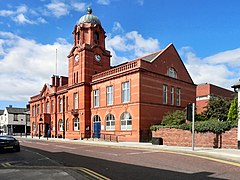Westhoughton
| Westhoughton | |
|---|---|
 Westhoughton Town Hall, built 1903 |
|
| Westhoughton shown within Greater Manchester | |
| Population | 24,974 (2011 Census) |
| OS grid reference | SD6505 |
| Civil parish |
|
| Metropolitan borough | |
| Metropolitan county | |
| Region | |
| Country | England |
| Sovereign state | United Kingdom |
| Post town | Bolton |
| Postcode district | BL5 |
| Dialling code | 01942 |
| Police | Greater Manchester |
| Fire | Greater Manchester |
| Ambulance | North West |
| EU Parliament | North West England |
| UK Parliament | |
| Website | Westhoughton Online |
Westhoughton /wɛstˈhɔːtən/ is a town and civil parish of the Metropolitan Borough of Bolton in Greater Manchester, England. It is 4 miles (6 km) southwest of Bolton, 5 miles (8 km) east of Wigan and 13 miles (21 km) northwest of Manchester.
Historically in Lancashire, Westhoughton was once a centre for coal mining, cotton-spinning and textile manufacture. Today it is predominantly a residential town with a population of 23,056, increasing to 24,974 at the 2011 Census.
Westhoughton incorporates several former villages and hamlets which have their own distinctive character, sports traditions and amenities including railway stations. They include Wingates (famous for the Wingates Band), White Horse, Over Hulton, Four Gates (or Fourgates), Chequerbent, which was all but destroyed by the building of the M61 motorway, Hunger Hill, Snydale, Hart Common, Marsh Brook, Daisy Hill and Dobb Brow.
The name Westhoughton is derived from the Old English, "halh" (dialectal "haugh") for a nook or corner of land, and "tun" for a farmstead or settlement – meaning a "westerly settlement in a corner of land". It has been recorded variously as Halcton in 1210, Westhalcton in 1240,Westhalghton in 1292, Westhalton in 1302 and in the 16th century as Westhaughton and Westhoughton
...
Wikipedia

